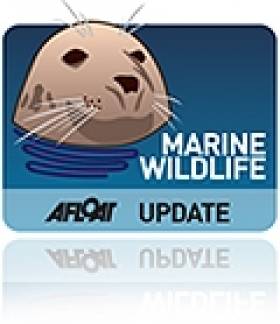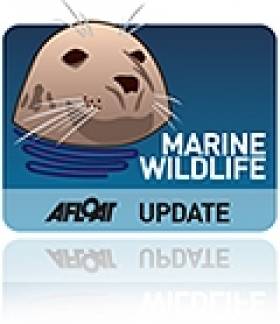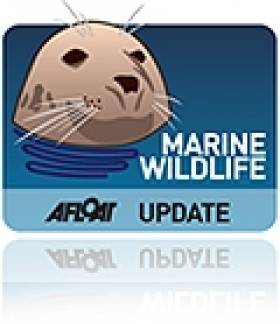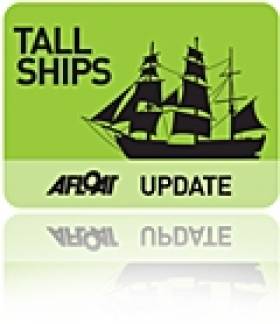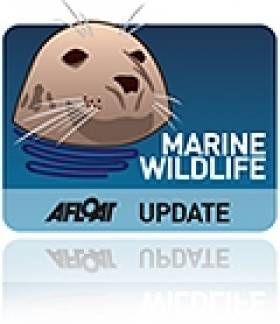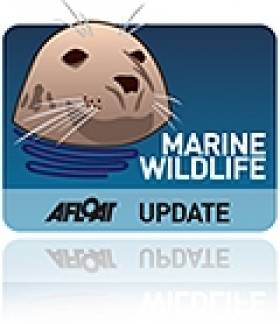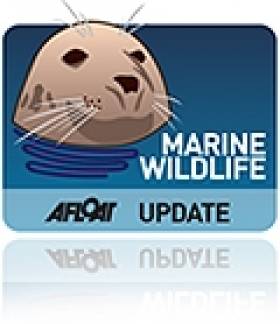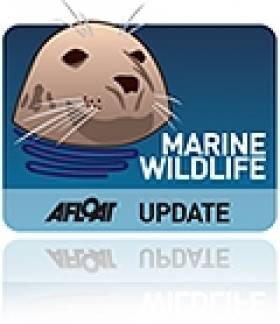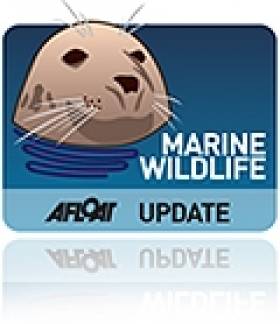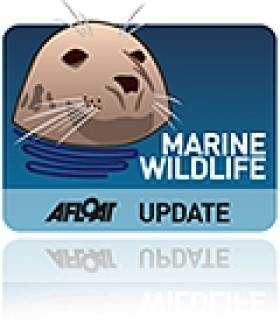Displaying items by tag: Irish Whale and Dolphin Group
Dusty The Dolphin Gets Dangerous With Doolin Dippers
#MarineWildlife - Dusty the dolphin has injured yet another swimmer off Doolin Pier in Co Clare in the latest of a recent spate of incidents, as The Irish Times reports.
Last night a woman was hospitalised after being struck by the dolphin's nose in the kidney area, leaving her "badly bruised and shocked by the incident".
It's since emerged that this was the fourth such attack by the bottlenose dolphin in the past month.
The cetacean responsible - a 14-year-old female - has made Doolin her home after many years in the Fanore area, and has apparently been responsible for a number of attacks on swimmers over the last two years.
But visitors continue to swim with the dolphin despite warnings by the Irish Whale and Dolphin Group (IWDG), which discourages any interference with the protected species.
The Irish Times has more on the story HERE.
Dublin Bay Porpoises Protected Under New Irish SACs
#MarineWildlife - The Irish Whale and Dolphin Group (IWDG) has welcomed the designation of a new special area of conservation (SAC) for marine wildlife in Dublin Bay.
As reported yesterday on Afloat.ie, Heritage Minister Jimmy Deenihan was on board the IWDG's research vessel Celtic Mist in Dun Laoghaire on Tuesday 16 July to lance the group's new atlas of marine mammal distribution in Irish waters - an event at which he also confirmed his extension of the protections already afforded to whales and dolphins over a number of coastal sites around Ireland.
The Dublin Bay SAC, running from Rockabill off Skerries to Dalkey Island, is one of the six new sites proposed by the minister's department late last year.
The list also features Blackwater Bank in Co Wexford, the West Connacht Coast, Hempton's Turbot Bank in Donegal, the Porcupine Bank Canyon off Kerry and the South-East Rockall Bank.
According to The Irish Times, the Dublin Bay conservation zone alone covers a sea area of 27,000 hectares and will extend protections under the 1992 EU Habitats Directive to the area's population of harbour porpoises.
New Atlas Of Ireland's Offshore Marine Mammals Launched
#MarineWildlife - Minister for Arts, Heritage and the Gaeltacht Jimmy Deenihan was on board the Irish Whale and Dolphin Group's (IWDG) research vessel Celtic Mist yesterday 16 July to launch a new atlas of marine mammals in Ireland's coastal waters.
The Atlas of the Distribution and Relative Abundance of Marine Mammals in Irish Offshore Waters marks the culmination of six years of surveys involving more than 1,000 says at sea, and provides up to date information for 19 species of cetaceans: whales, dolphins and porpoises.
Ireland is home to a remarkable diversity of whales and dolphins, and the new atlas shows how common and widespread some of these species are - from the harbour porpoise and common dolphin to the much larger fin whale.
Not all Irish cetaceans are so common, however, and the atlas also highlights the importance of Irish waters for some of the Atlantic’s rarer deepwater species such as the sperm whale and several beaked whales.
These are species about which very little is known, the IWDG says more work will be required in the coming years to allow a better understanding of the conservation requirements of these animals.
Every six years, Ireland is obliged to report on the conservation status of all of its marine mammals as part of its commitments under the European Union’s Habitats Directive. The data from this atlas has already proved invaluable in underpinning Ireland’s 2013 report to the European Commission.
Speaking at the launch yesterday in Dun Laoghaire, Minister Deenihan commended the work undertaken to produce the atlas.
“This fine atlas is the culmination of many years of work by a large number of people and I’m happy to note that it was produced under a project funded over several years by my department in collaboration with the Marine Institute," he said.
"As minister, I have also extended the protection afforded to whales and dolphins through the designation of additional marine special areas of conservation. I would like to thank the Irish Whale and Dolphin Group for this excellent publication.”
The atlas is available as a PDF to download HERE.
Celtic Mist in Dun Laoghaire Ready For Gathering Cruise
#CelticMist - The Irish Whale and Dolphin Group's (IWDG) research yacht Celtic Mist is currently docked in Dun Laoghaire awaiting the start of The Gathering Cruise around Ireland.
As previously reported on Afloat.ie, the 19-day event will see some 100 cruising boats proceed along the east and south coasts of Ireland from Dublin to Cork and Kerry.
Along the way they will be recording any sightings of whales or dolphins along the way using forms supplied by the IWDG.
Celtic Mist will join the flotilla as it departs Dun Laoghaire Harbour on 18 July headed for Kinsale on 24 July, and a second leg from Kinsale to Dingle from 25 July to 1 August.
And the IWDG is currently offering places on board to all members for both week-long legs of the cruise.
The vessel has eight berths that will comfortably sleep a team of one skipper and seven crew - indeed, anyone taking up this offer will be expected to prepare meals and perform other sailing duties!
For more details on how to join The Gathering Cruise on board Celtic Mist, see the IWDG website HERE.
In the meantime, Celtic Mist is offering all IWDG members a chance to sail on day trips from Dun Laoghaire this week - email [email protected] for details.
New Research Says Sonar Sends Whales Scurrying
#MarineWildlife - The Guardian reports on new research which proves that military sonar has a direct effect on the behaviour of whales in our oceans - even leading to mass strandings.
The studies, part funded by the US Navy, found that beaked whales where particularly sensitive to sonar - and that even blue whales, the largest animals on earth, were distracted from feeding by the subsurface noise.
It's long been feared that the use of sonar is to blame for unusual behaviour among whales, who navigate and communicate with each other over long distances using sound.
As previously reported on Afloat.ie, the Irish Whale and Dolphin Group (IWDG) identified sonar activity by Royal Navy submarines as a possible cause of a the mass stranding of pilot whales in Donegal in November 2010, in which as many as 35 whales died.
Now for the first time, sonar has been proven to affect behaviour of cetaceans to a detrimental degree, confirming for many a connection between the use of sonar technology and recordings of whale and dolphin strandings identified since the 1950s. The Guardian has much more on the story HERE.
In more positive whale-related news, the IWDG reports that its next Cape Clear summer whalewatching course over the weekend of 26-28 July is "filling up nicely".
Places are still available but as it coincides with the tourism high season in West Cork, anyone interested is advised to book sooner than later to ensure they have someone to stay nearby.
The most recent weekend course over the June bank holiday witnessed numerous harbour porpoises and common dolphins, but its hoped the elusive whales will make an appearance next time round!
Strange Case of Stranded Dolphin Found Two Miles Inland
#MarineWildlife - In a week that saw the Isle of Man's first sighting of a humpback whale for three years, BBC News reports on the strange discovery of a rare species of dolphin two miles inland from the shore in Co Donegal.
The carcass of an Atlantic white-sided dolphin was found on a hillside near Meenbanad with head injuries - but no one knows how it got there.
Pádraig Whooley of the Irish Whale and Dolphin Group (IWDG) said it's most likely that someone found the dead cetacean on the beach and took it to the hillside to decay so that its skeleton could later be retrieved.
The dolphin is thought to be one of a pod that beached at Traigheanna Bay in Dungloe on 21 June. The species is a rare sight in Irish coastal waters, said Whooley, because they tend to feed much further out at sea.
In other stranding news, the IWDG reports that a bottlenose dolphin who live stranded at Beal in Co Kerry last summer has been recorded in the Shannon Estuary with her calf on a number of occasions this month and last.
The Shannon Dolphin and Wildlife Foundation has more on the sightings of the dolphin they now call Sandy Salmon.
Shannon's First Recorded Dolphin Spotted Again 20 Years On
#MarineWildlife - The 21st year of dolphin research in the Shannon Estuary is off to an amazing start after the first ever dolphin recorded in the estuary was spotted on the Kerry coast.
As the Shannon Dolphin and Wildlife Foundation (SDWF) reports, the dolphin known as 'No 1' was sighted in Brandon Bay on Saturday 25 May swimming in a group of three.
No 1 is happily a familiar sight in the region, having been recorded most years since the project began in 1993.
"It has long been known that Shannon dolphins regularly use Tralee and Brandon Bays but how important the area is in not clear," says the SDWF on its blog. "If we are to protect the Shannon dolphins we need to ensure we identify all their important habitats and extend protection to these areas if necessary."
Meanwhile, its been confirmed that the trio of bottlenose dolphins who took up residence near Bunratty Castle in the spring have been observed in the mainstream of the Shannon Estuary.
The three were spotted on the first monitoring trip of the summer from Kilrush last week by SDWF researchers of Moneypoint.
"This demonstrates again the value of long term monitoring and the power of a photo ID catalogue to monitor the Shannon dolphins," says the SDWF blog.
In other cetacean news, an in-depth discussion of the Shannon's dolphins and the Irish Whale and Dolphin Group's (IWDG) research of bottlenose dolphins around the Irish coastline was broadcast on Derek Mooney's afternoon show on RTÉ Radio 1 recently.
A podcast of the 30-minute segment of Mooney Goes Wild from Friday 31 May is available to download HERE.
On the Radio: Trailing The Fin Whale
#MarineWildlife - Tonight's Nature on One on RTÉ Radio 1 joins the Irish Whale and Dolphin Group (IWDG) on a quest off Hook Head to find the majestic fin whale.
As TEN reports, Colin Stafford Jones was on board with the IEDG's Pádraig Whooley on a mission to track down the world's second largest animal - not only the biggest example of marine wildlife behind the incredible blue whale.
Their adventure will be broadcast tonight (Sunday 9 June) from 7pm on RTÉ Radio 1, and will be available to listen online afterwards via the Nature on One website HERE.
Beaked Whale Strandings Total 3 For May
#MarineWildlife - Another beaked whale stranding has been recorded on the Irish coast just weeks after two of such creatures were found in Donegal.
A ranger with the National Parks and Wildlife Service (NPWS) made the discovery at Aillebrack in Co Galway on the evening of 27 May.
The 5m carcass of a female - like the female and juvenile found in the northwest - is thought to be either a True's or Sowerby's beaked whale.
Mick O'Connell, strandings officer with the Irish Whale and Dolphin Group (IWDG), says the latest stranding "raises new questions", with suspicion that its death may be linked to the face of the Donegal pair earlier this month.
As previously reported on Afloat.ie, beaked whales are a rare occurrence in Irish waters, with the last record before this month' stranding made in 2009.
#MarineWildlife - A gray whale has been sighted many thousands of miles from its usual Pacific swimming grounds in the South Atlantic.
As Pádraig Whooley writes on the Irish Whale and Dolphin Group (IWDG) website, the whale was spotted in the last week in Walvis Bay, Namibia - only the second ever confirmed sighting of the marine species in the Atlantic Ocean, and the first south of the equator, since records began.
Previously a solitary gray whale was tracked in the Mediterranean in May 2010 from the coast of Israel to Barcelona in north-eastern Spain.
That was the first time a gray whale had been seen anywhere east of the Pacific Ocean following the presumed extinction of the Atlantic gray whale in the 17th century.
Whooley calls the latest sighting "a fascinating discovery" and says it "points strongly towards a dramatic shift in distribution facilitated by climate change.
"This is a timely reminder that we should never assume to know what species occur in our local waters, especially when this species seems to have literally come back from the dead."


























